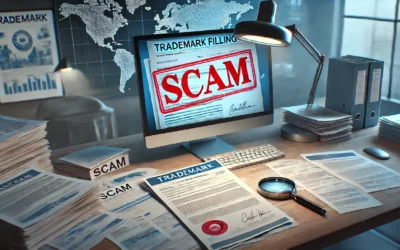Social media has become a powerful platform for individuals to share their ideas, opinions, and expertise. It also enables influencers to build personal brands and connect with a global audience. Influencers have a power to sway opinions and shape trends, like never before in human history. This global audience, often in millions or in some cases hundreds of millions, also means a large potential or actual client/customer base. In many cases, influencers are owners of massive global businesses, with revenues coming from multiple sources. Like with any other business, intellectual property plays an important role.
Trademarks
The influencers typically use their own name (e.g. Kim Kardashian) or an invented stage name such as Mr. Beast or PewDiePie.
Regardless of which type of name you use, it is important to protect it as a trademark. Without trademark protection, it will be difficult to prevent others from using the same or similar name in exploiting the fame of the influencers. For example, taking action against infringing social media account names or domain name registrations will be very difficult without a trademark registration.
If you are starting your social media influencer journey, make sure that the name you choose is a) protectable and b) does not infringe on other trademarks.
For a trademark to be protectable, it needs to be distinctive. Trademarks that merely describe the product or service (“The Daily”) cannot be protected as trademarks as trademark for a daily podcast. In fact, “The Daily” trademark was refused by the United States Patent and Trademark Office (USPTO) as it “merely describes that applicant’s goods and services are issued every weekday. Thus, the applied-for mark merely describes a characteristic or feature of applicant’s goods and services.”
Naming channels or podcasts descriptively (for example, “Business Talk” or “Money Matters”) is a common practice. If you take this route, it will be difficult to protect your brand. In that case, it is best to make a distinctive logo and register that as a trademark. An example of this (although it did not start as a social media venture) is Freakonomics.
Using personal names is also common. In many countries, personal names can be protected as trademarks but you should be aware that there are also countries that do not accept personal names as trademarks. This varies country by country. There are some countries where surnames cannot be registered as trademarks, and there are countries where the combination of a first name and surname is not registrable.
Invented names that do not describe the goods or services in question (like “Mr. Beast” or “PewDiePie”) are protectable. Names that simply describe the activities of the influencer are not protectable.
Another aspect that must be considered is that since influencers use social media channel names and stage names for commercial purposes, they need to be mindful of other companies’ trademarks.
If you use your own name, there are countries that have an “own name defence” meaning that you are allowed to use your own name for commercial purposes even if there are prior similar trademarks. For example, the EU trademark law allows for this, but this applies only to those who are acting as sole proprietors and there are also extra requirements that must be met. To be on the safe side, it is better to consider your own name like any other trademark when it comes to possible infringement of other companies’ rights.
Regardless of whether you use your own personal name or invented name, it is important to make sure that you are not infringing on existing trademarks. Before committing to a name, make trademark searches to make sure that the same or similar name has not already been registered for the business you’re at.
So what’s the business? As said, influencers often have various revenue streams that qualify as businesses. Trademark rights always exist in relation to “goods” (for example, shoes) and “services” (for example, legal services) that must be specified in the trademark application.
Making videos could be considered as “entertainment”, “education” or “providing information” on a specific topic. This is the case even where the content is available on free platforms like YouTube. The content is free because of advertisements, part of which goes to the influencer.
In addition, influencers often receive a significant part of their revenue from commercial partnerships with other brands. This would qualify as “advertising, marketing and promotional services”, or “product demonstrations and product display services”.
Sometimes influencers have their own products or consulting services. The trademark should be protected with respect to these just like the trademarks of any other business. For example, if you have your own cosmetics brand, you should protect that in trademark class 3 (cosmetic products) and perhaps also in other ancillary classes. If you provide wellness and life coaching, you should protect your trademark in class 41. If you provide business consulting, you should protect your trademark in class 35.
You should also remember that trademark registrations are territorial rights. You need to register your trademark in all countries where you want to have trademark protection.
Without a registered trademark, it will be difficult or impossible to take action against others using the same or similar names in social media platforms (provided that the other uses the name for commercial purposes) and take down infringing domain names. Trademarks are essential tools in protecting your brand identity.
Copyright
Influencers are essentially content creators. Copyright protects the content you create, such as your presentations, videos, blogs, and other creative works. The content created by influencers is typically their most important asset.
Copyright protection arises automatically without the need to register it. In most countries, it is not even possible to register a copyright. In others, such as the US and China, it is possible to register it and doing so will give you enhanced protection and rights.
To get copyright protection, the work must satisfy the “originality” threshold. For literary and multimedia works the threshold is typically satisfied.
The goods thing about copyright is that it is recognised almost globally, so when you create the work in one country (let’s say France), other countries will recongise that you own the copyright and can enforce it in these other countries as well.
Copyright allows you to decide how your work is used. Copyrighted work cannot be used (copied, distributed, made available for public, etc.) without your permission. Copyright lasts usually 70 years after the year of the author’s death.
One aspect you must take into account is that, as a general rule, the copyright belongs to the author. If you are a sole entrepreneur doing everything yourself, this is not a problem. However, many successful influencers have large teams and outside contractors helping with the production. This work can include writing texts, making videos or creating other content. You should remember that, unless otherwise agreed, the copyright will automatically belong to the creator. This means, for example, that if your staff writes a blog post or a video script, he/she will be the owner of the copyright unless it is transferred to you. The easiest way to do the transfer is to include a copyright transfer clause in the employment contract.
When dealing with employees and external contractors, always make sure to have a written agreement transferring the copyright to you.
Other IP rights
Trademarks and copyrights are important to practically all influencers and social media personalities. In addition to these, it is possible that designs and even patents are sometimes relevant.
The popular YouTube channel, Unnecessary Inventions, solves “real world problems that do not exist by designing & creating products that no one is asking for”. The owner of the channel, Matty Benedetto, creates innovative products that in many cases could be protected with design registration (design patents in the US) or even with patents.
Here are some of his designs and inventions
If you create innovative products, it is always important to remember that you should protect them before any public disclosure. For example, a YouTube, TikTok or Instagram video showing the design or invention can lead to it not being protectable anymore.
The EUIPO recently cancelled Puma’s shoe design registration because it turned out that Rihanna had posted photos on her Instagram account of the shoes two years prior to the registration. If designs and patents are important to you, you need to be careful not to disclose the designs and inventions before you have filed for protection.
Conclusion
Trademarks and copyrights are important to all influencers. To be able to influence, a precondition is that you are known by others. Others know you by your name, whether it is an invented stage name or your real personal name. This name is your trademark, and it is a valuable asset that should be protected. You protect it with a trademark registration.
The content you create gets automatic protection by way of copyright. Although copyright protection is automatic, you should also consider registering your copyright in those countries where it is possible, since registration gives you extra protection. The most important practical point about copyright that you absolutely must know is that it belongs to the original creator. So if you use employees or contractors, make sure you transfer the copyright to you. The mere fact that you have paid for the work does not by itself transfer the copyright to you.
Finally, if you work with product design and innovations, make sure that you always consider design and patent protection before you publish your work.
You may also want to read:
Using personal names as trademarks – what you need to know
Small but mighty – use your size to build a powerful brand



